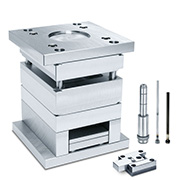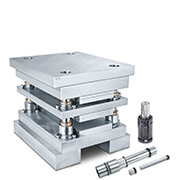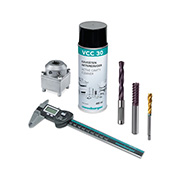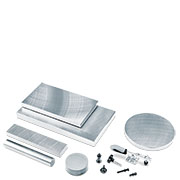Tool holders – overview of the most important connections
Anyone looking for tool holders for milling machines faces a wide range of choices. It can be hard to keep track of them all. To give you a better understanding of all the options and make your decision easier, we have summed up the most important standards in the area of cutting tool holders.
Read moreCorrosion protection for your moulds
The best possible corrosion protection is essential for storing and transporting high-quality moulds. But what makes corrosion protection good? We explain this to you and show you how you can easily improve the protection quality.
Read moreMilling copper electrodes and aluminium materials without clogging
Non-ferrous metals are used daily in mould and die making. Aluminium alloys and copper are machined most frequently. Due to the nature of these materials, many milling cutters can have defective results and get clogged. We show you what to look out for and which cutting tools are best suited for machining.
Read moreTips for better identification of lifting equipment for periodic inspection
Safe lifting and transporting of heavy loads requires perfectly functioning lifting equipment. Worn lifting equipment can quickly have significant consequences, so regular inspection is very important.
Read moreWell organised thanks to uncomplicated material marking
Leftover materials or cuts are often returned to the warehouse after sawing without being labelled, which can quickly become confusing. Sound familiar? We tell you what your options are to solve this challenge.
Read moreComponents Die sets Machining Workshop equipment
Consumables
Cleaning, lubricating, protecting and much more - finding and purchasing the right product for your application can be difficult. With our consumables, you have access to a specially selected range which many of our customers have been using successfully for years.
Read more


 © 2024 by Meusburger Georg GmbH & Co KG | All rights reserved
© 2024 by Meusburger Georg GmbH & Co KG | All rights reserved





 Česká republika [CS]
Česká republika [CS]
 Danmark [DA]
Danmark [DA]
 Deutschland [DE]
Deutschland [DE]
 España [ES]
España [ES]
 France [FR]
France [FR]
 India [EN]
India [EN]
 Italia [IT]
Italia [IT]
 Magyarország [HU]
Magyarország [HU]
 México [ES]
México [ES]
 Nederland [NL]
Nederland [NL]
 Österreich [DE]
Österreich [DE]
 Polska [PL]
Polska [PL]
 Portugal [PT]
Portugal [PT]
 România [RO]
România [RO]
 Schweiz [DE]
Schweiz [DE]
 Slovenija [SL]
Slovenija [SL]
 Srbija [SR]
Srbija [SR]
 Suomi [FI]
Suomi [FI]
 Sverige [SV]
Sverige [SV]
 Türkiye [TR]
Türkiye [TR]
 United Kingdom [EN]
United Kingdom [EN]
 USA [EN]
USA [EN]
 Ελλάδα [EL]
Ελλάδα [EL]
 България [BG]
България [BG]
 Росси́я [RU]
Росси́я [RU]
 华 [ZH]
华 [ZH]